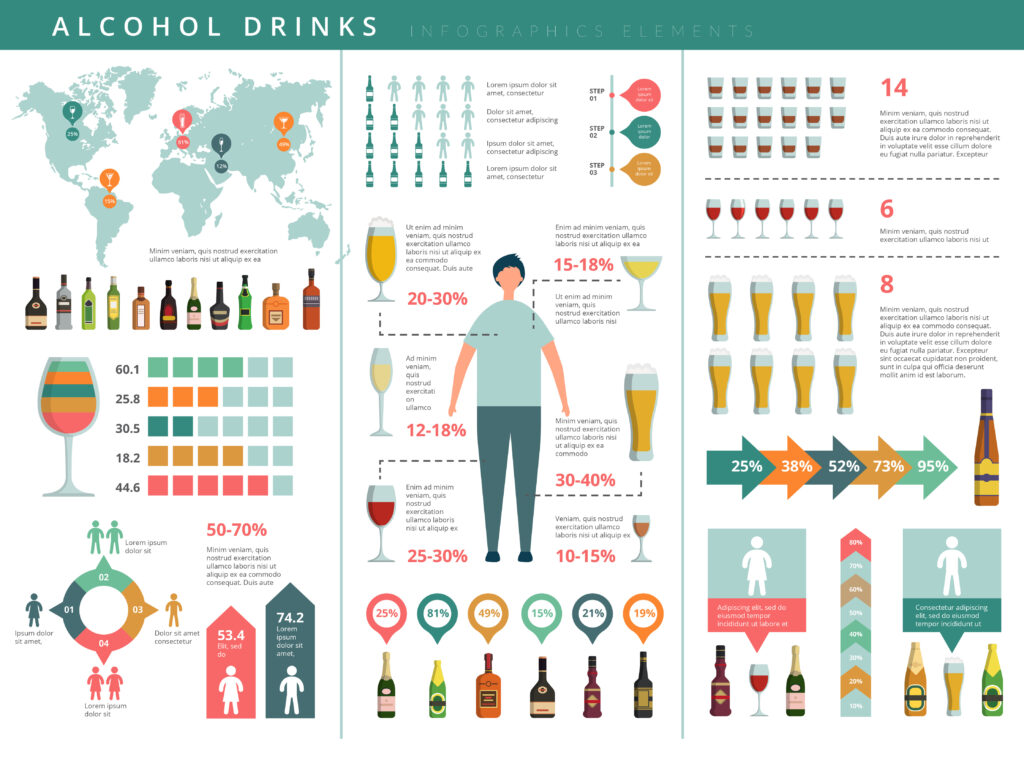Signs of Alcohol Withdrawal
The signs of alcohol withdrawal can vary significantly depending on the individual and the severity of their alcohol dependence. Symptoms typically begin 6 to 24 hours after the last drink and can range from mild to severe.
- Mild Symptoms: These include anxiety, insomnia, nausea, headaches, and mild tremors.
- Moderate Symptoms: Individuals might experience increased heart rate, sweating, confusion, and more pronounced tremors.
- Severe Symptoms: Known as Delirium Tremens (DTs), severe withdrawal can lead to hallucinations, seizures, extreme agitation, and confusion, which can be fatal if not treated.
Alcoholism Statistics
Understanding the extent of alcoholism and its implications demands a look at statistics. The World Health Organization (WHO) reports that nearly 3 million deaths annually are attributed to alcohol consumption, representing about 5.3% of all deaths worldwide. In the United States, the National Institute on Alcohol Abuse and Alcoholism (NIAAA) reports that approximately 14.5 million adults ages 18 and older have Alcohol Use Disorder (AUD). Alcohol consumption is the third leading preventable cause of death in the U.S., with an estimated 95,000 people dying annually from alcohol-related causes.

The Dangers of Alcohol Withdrawal
Alcohol withdrawal poses significant dangers, especially when severe symptoms are left untreated or unmonitored. The withdrawal process can strain both the body and mind, leading to complications that require immediate medical attention. Without proper care, individuals are at risk of life-threatening outcomes.
One of the most critical dangers of alcohol withdrawal is the potential for seizures, which often occur within the first 48 hours. Seizures are sudden and unpredictable, making them a significant concern for those detoxing without medical supervision. Another severe complication is delirium tremens (DTs), the most extreme form of withdrawal. DTs are marked by severe mental confusion, hallucinations, and autonomic instability, and they can be fatal without prompt treatment.
Additionally, underlying health conditions, such as heart disease or diabetes, can increase the risks during withdrawal, further complicating the detox process. Beyond the physical risks, alcohol withdrawal can also take a heavy psychological toll. Individuals may experience heightened depression and suicidal ideation, particularly those already struggling with mood disorders. These factors highlight the importance of seeking professional medical support during alcohol withdrawal.
Importance of Professional Detox
Because of the complexities and potential dangers associated with alcohol withdrawal, seeking professional detox is crucial. Detoxification under medical supervision offers numerous benefits:
- Safety: In a controlled environment, healthcare professionals can monitor vital signs, prevent complications, and provide immediate intervention if needed.
- Medically Assisted Withdrawal: Treatment centers may use medications to alleviate withdrawal symptoms and reduce the risk of severe symptoms, making the process more comfortable.
- Psychological Support: Professional settings provide access to counselors and therapists to address the emotional and psychological aspects of withdrawal and addiction.
- Preparation for Treatment: Detox is only the first step in recovery. A structured detox environment often leads to a smoother transition to ongoing treatment programs, which is vital for long-term sobriety.
Why Choose The Retreat of Boston for Detox?
If you’re in Boston or the surrounding area, The Retreat of Boston offers an exceptional setting for detox. With a commitment to providing personalized care in a supportive environment, our program is tailored to meet the needs of each individual. Our team of experienced medical professionals and counselors work together to create a comprehensive detox plan that ensures safety and comfort.
We understand the courage it takes to begin this journey and provide compassionate care to support you every step of the way. Our facility is equipped to handle all stages of withdrawal, and our staff is experienced in managing both the physical and emotional challenges that arise during detox.
Call to Action: Start Your Journey Today
Taking the first step towards recovery is a monumental decision and one you should not have to face alone. If you or a loved one is struggling with alcohol addiction, don’t wait for the situation to worsen. Reach out to The Retreat of Boston and let us guide you through safe and effective detoxification.
Transition towards a healthier life today. Call us now or visit our website to learn more about our detox program and set up a consultation. Remember, the path to recovery is just a phone call away, and we’re here to support you along every step of your journey.




